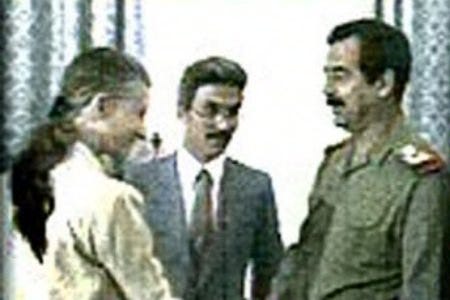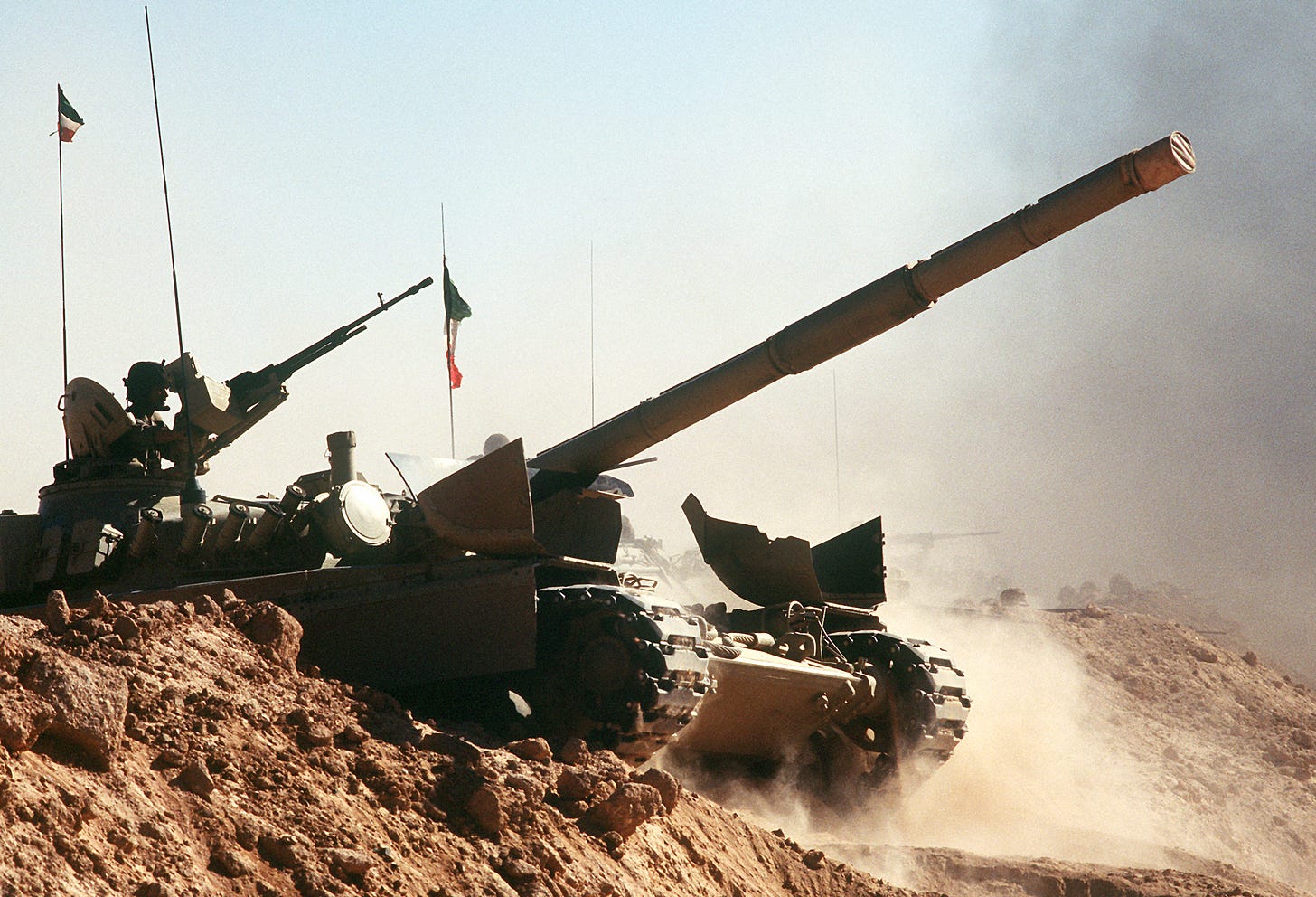Today in Middle Eastern history: Iraq invades Kuwait (1990)
The long American obsession with Saddam Hussein begins in earnest.
If you’re interested in history and foreign affairs, Foreign Exchanges is the newsletter for you! Sign up for free today for regular updates on international news and US foreign policy, delivered straight to your email inbox, or subscribe and unlock the full FX experience:
It took just under 2 years from the end of the Iran-Iraq War for Iraqi leader Saddam Hussein to irrevocably destroy his relationships with his two biggest allies, Kuwait and the United States. Yes, that’s right, today is the anniversary of Saddam’s decision to invade Kuwait and officially kick off the Gulf War, aka “The War Against Iraq That Maybe Actually Wasn’t So Bad, If You Think About It In A Certain Way. I Mean If You Just Look At It In Total Isolation, Right? No? Seriously? God, Why Are You Always Like This?”
Saddam’s reasons for invading Kuwait were varied and complex—just kidding, it was pretty much all about money. Kuwait had it and Saddam didn’t. In particular, Saddam didn’t have the money to repay the loans Kuwait had floated him during the Iran-Iraq War. The Kuwaitis had spent a good portion of the war serving as Iraq’s main port, since Iraq’s largest port city, Basra, was mostly shut down due to the fighting. The Kuwaitis also lent Iraq a lot of money to keep fighting. They expected to be reimbursed for both services.
Initially Kuwait didn’t want to get involved in the Iran-Iraq War, but then its ruling Sabah family started to worry that its own subjects (especially its large Shiʿa minority) were looking at the Islamic Revolution and getting some funny ideas. So they decided to throw in with Saddam. His Baʿathist ideology was just as opposed to the idea of monarchy as Iran’s revolutionary ideology was, so that was a bit of a concern. But here’s the thing: Saddam didn’t really care about his ideology, and he certainly had no interest in exporting it. Iran’s new leaders did, on both counts, and so Kuwait’s rulers decided that Saddam was clearly the lesser of two evils.
Anyway, long story short, the Iran-Iraq war ended. While neither side really “won” the war, Iraq had been the aggressor and so was worse off for the war having achieved virtually nothing apart from a lot of senseless death and destruction. Iraq had also gone into heavy debt to finance the war, and its failure to annex any of Iran’s oil-rich territory or gain control over the Shatt al-Arab waterway meant that it wasn’t going to have a way to pay its creditors back anytime soon. Kuwait, of course, was one of the largest of those creditors.
Now you might think that, what with all their massive oil wealth and the fact that they were really paying Saddam to fight the war kind of on their behalf, the Kuwaitis could afford to forgive some or all of Iraq’s debt. That’s certainly what Saddam thought. But the Kuwaitis saw things differently, and they wanted to be repaid. The two countries were also on opposite sides of a debate over oil prices within OPEC. Iraq wanted the cartel to cut production in order to drive prices up, but Kuwait, which didn’t mind low oil prices at the time, pushed to be allowed to increase its own production and then pretty much ignored its caps anyway. According to financial experts, this cost Iraq “a whole lot of money.”
Then things really turned ugly. Iraq started accusing Kuwait of slant-drilling into Iraq’s side of their shared Rumaila oil field. They had no evidence for this charge apart from the fact that Kuwait was producing more oil from the field than Iraq was, which was easily explainable since Iraq had just come out of a grueling 9 year war and Kuwait, you know, hadn’t. Iraq probably did lose oil in the field to Kuwait, but that’s because oil, and bear with me because this gets technical in a geological sense, is a “liquid,” which can “flow” from place to place, so when one side of an oil field is being exploited while the other isn’t, the oil on the unexploited side will “flow” in the “direction” of the side where the pumping is happening. Science!
The Iraqis later justified invading Kuwait on the basis of economic justice, citing everything we’ve just noted, and also by claiming that Kuwait had always been a “province” of Iraq. Considering there had never been an “Iraq” (at least not in the nation-state sense) prior to the end of World War I, this was a bit of a weird claim to make, though it’s one that Iraqi leaders had made multiple times since the breakup of the Ottoman Empire.
Kuwait had been nominally Ottoman since it was founded (as a city-state) in the 17th century, and it had been part of a province that was administered by Ottoman authorities in Basra, so I guess that does create a historical link between the two countries. But Kuwait had been mostly autonomous for its entire existence, and cut its own deal with Britain in 1899 that formalized its autonomy from the rest of the Ottoman Empire. It became a British protectorate in 1913 under an Anglo-Ottoman treaty and stayed that way until achieving independence in 1961, well after “Iraq” had come into being. So no, it was never part of “Iraq,” the nation-state, and historically it had been de facto, if not quite technically, separate from what became Iraq for at least a century, and arguably longer than that.
I’m sure many or all of you know what happened next. The Iraqis took their complaints about Kuwait to the US, whose ambassador, April Glaspie, who told Saddam that “we have no opinion on the Arab-Arab conflicts, like your border disagreement with Kuwait,” but also expressed US “concern” over his military buildup in southern Iraq. Guess which part of her remarks Saddam heard and which he willfully missed.
A very low res photo of Glaspie’s meeting with Saddam (Wikimedia Commons)
On August 2, 1990, the Iraqi military launched a nighttime invasion of Kuwait, whose forces were completely caught off guard and wouldn’t have stood much of a chance even if the Iraqis had telephoned beforehand. The much larger and more powerful Iraqi army swarmed into the country and had it under their control within the first day. Kuwait’s emir, Jaber al-Ahmad al-Sabah, skedaddled over the border and into Saudi Arabia, but most of his subjects weren’t so lucky and wound up stuck in Iraqi-occupied Kuwait.
A Kuwaiti tank participating in “Operation Desert Shield,” the US-led mission to block the Iraqi army from invading Saudi Arabia while preparing for an offensive to drive Iraqi forces out of Kuwait (DoD photo via Wikimedia Commons)
An estimated 4200 Kuwaitis were killed in the initial invasion, and more died in the weeks that followed, as many of them formed resistance cells and engaged in a guerrilla campaign against their Iraqi occupiers. The Iraqis have since been accused of a raft of war crimes during their occupation of Kuwait, but while atrocities undoubtedly took place the extent of them has been lost amid the outright fabricated PR campaign crafted by the Sabah family to drum up international outrage over the invasion. The American, and international, outcry against Iraq’s move was swift and unusually universal, but that’s a story for another time.



